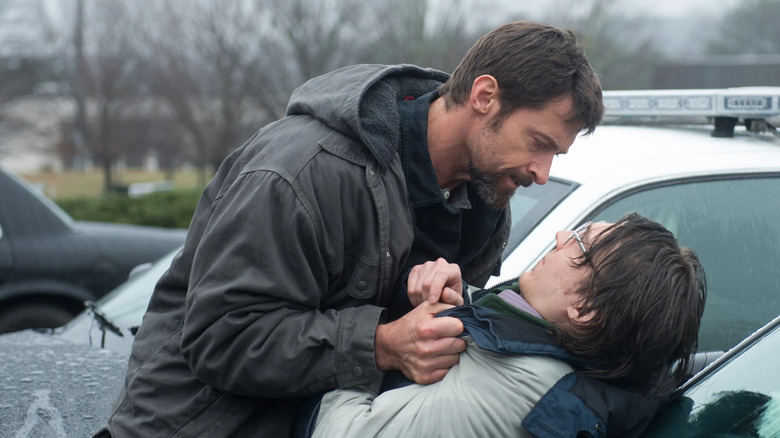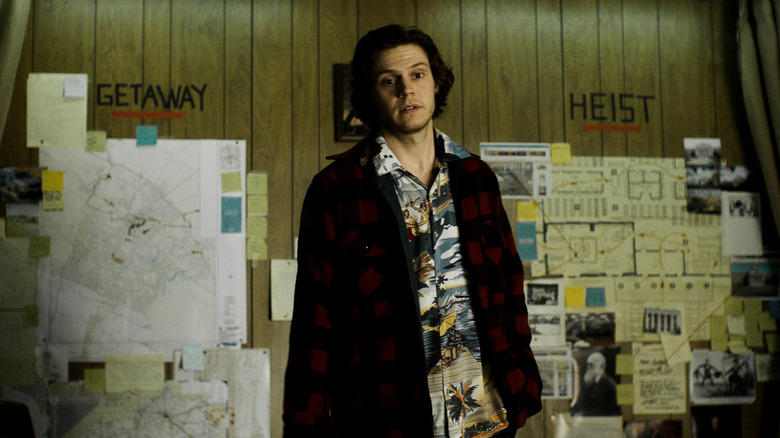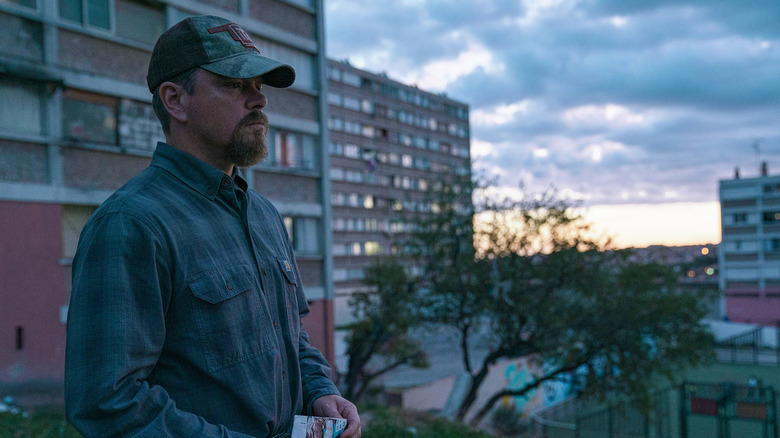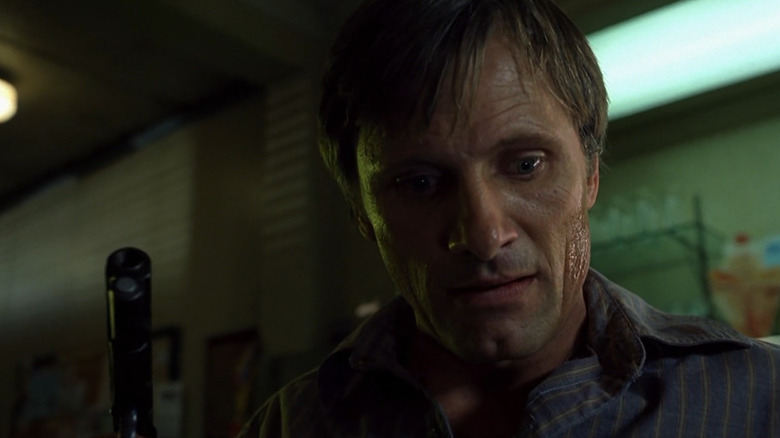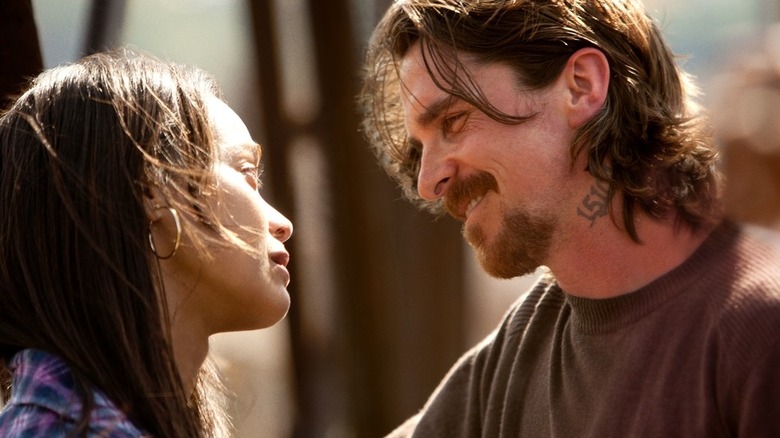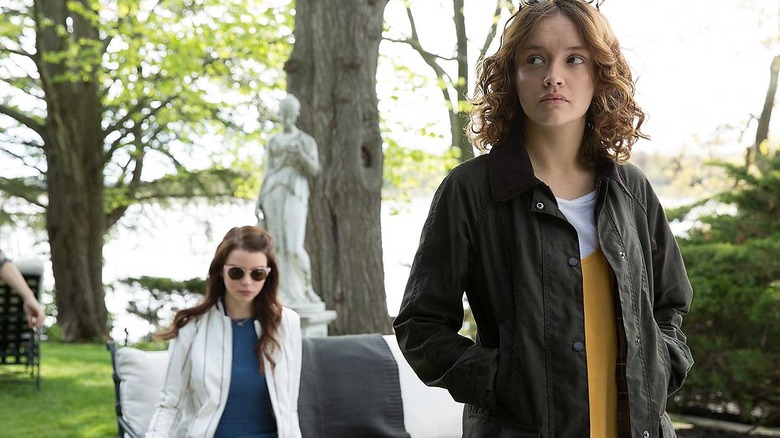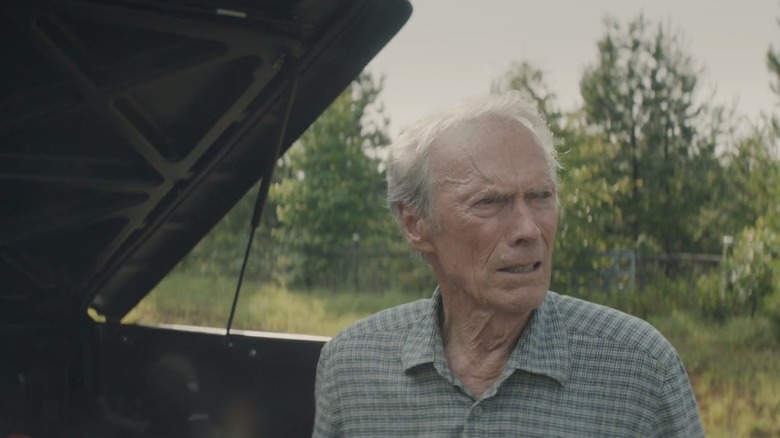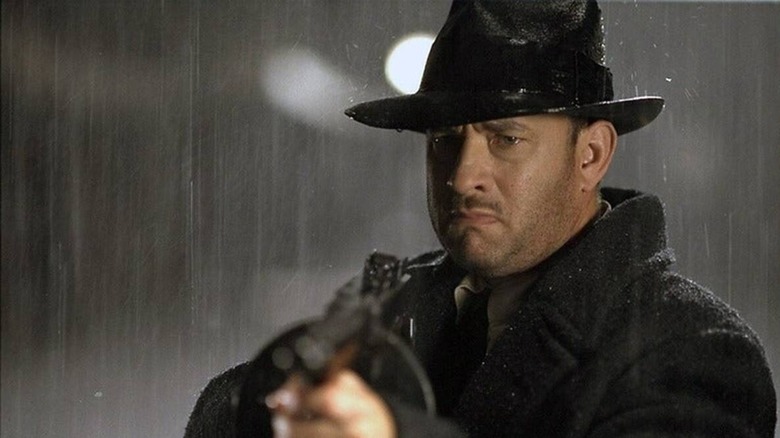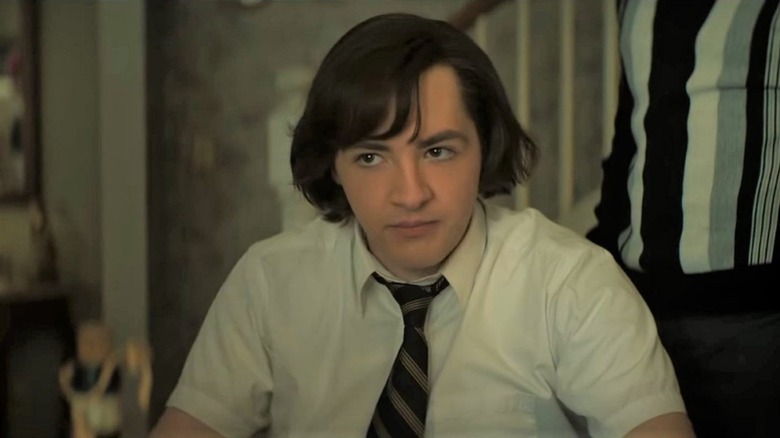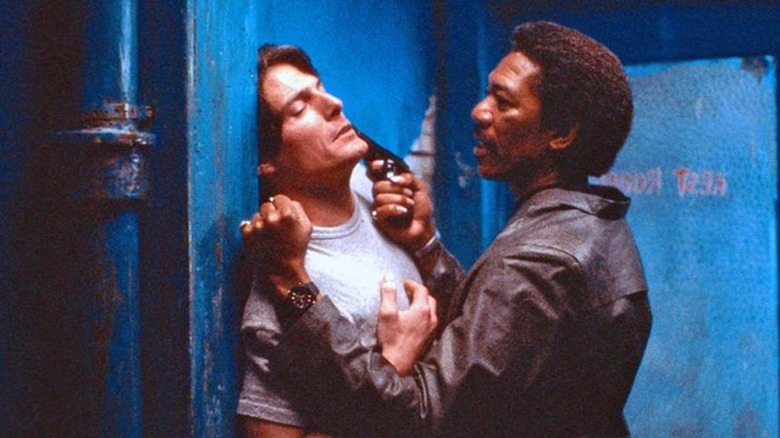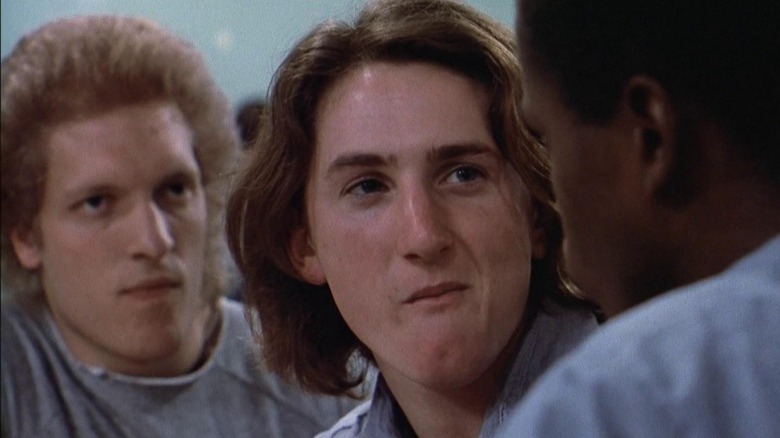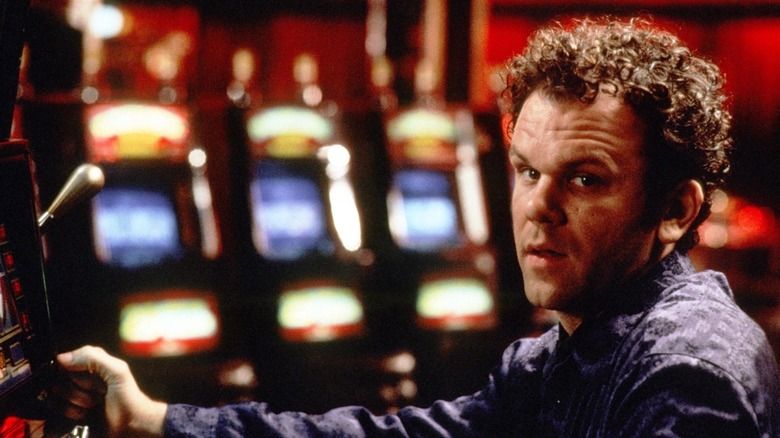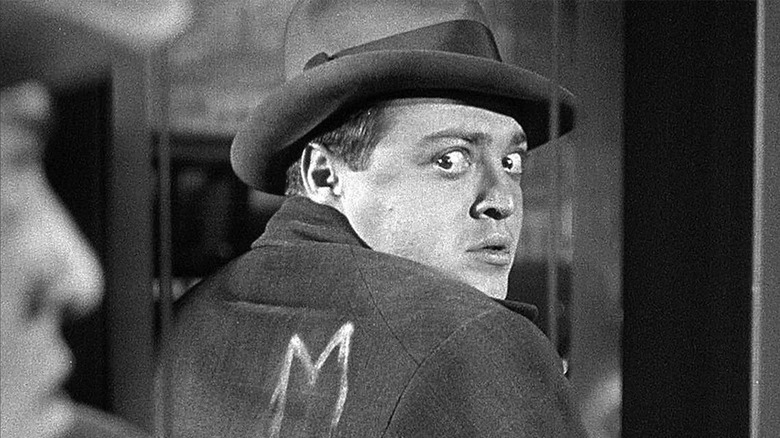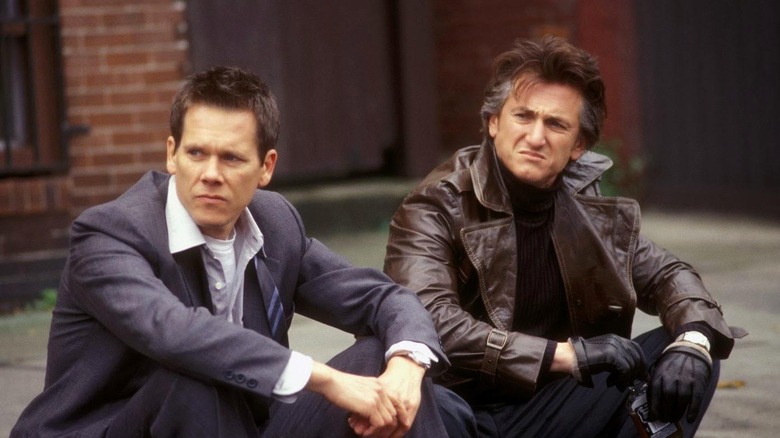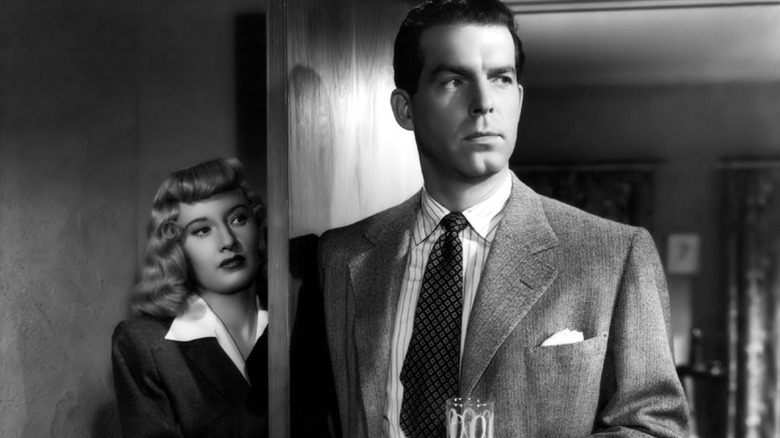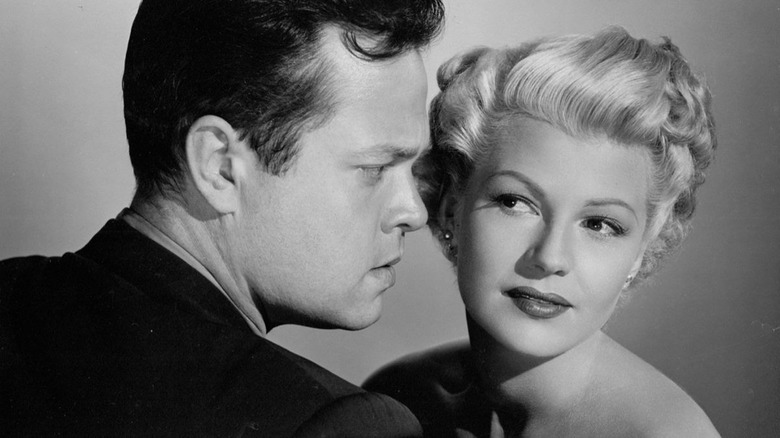15 Movies Like Prisoners That You Need To See
What's the worst thing that can happen over the Thanksgiving holiday weekend? Maybe your flights got delayed. Perhaps, the football game you were excited about ended in disappointment. A few awkward dinner conversations or a less-than satisfying meal may have made the holiday evening a little bit uncomfortable for your tastes. However, that can't compare with the truly nightmarish events that take place in Denis Villeneuve's 2013 thriller "Prisoners."
There aren't a lot of quintessential "Thanksgiving movies," but "Prisoners" is about as different from "Planes, Trains, and Automobiles" as you can get. Set in Pennsylvania, the film follows two families celebrating Thanksgiving dinner together. In the hours before the table is set, the two young girls Anna Dover (Erin Gerasimovich) and Joy Birch (Kyla-Drew Simmons) go missing. This leads to chaos within the household, and after a frantic search, the two families are unable to locate the children. The police dispatch Detective Loki (Jake Gyllenhaal) to investigate the girls' disappearance, and he discovers that there might be much more to the case than he had expected.
If you loved "Prisoners," you owe it to yourself to check out these great films as well.
American Animals (2018)
One of the most disturbing storylines in "Prisoners" is Keller Dover's (Hugh Jackman) fascination with a mysterious man, Alex Jones (Paul Dano), whom he believes is involved in his daughter's kidnapping. Although Loki tells Dover that they can't arrest Jones without evidence, this only makes Dover more angry; he insists that the law isn't going far enough, and decides to take matters into his own hands.
The question of whether "good" people are capable of doing heinous things is the premise of another excellent crime film, 2018's "American Animals." The film is told in a quasi-narrative, quasi-documentary style. It centers on the story of four students at Transylvania University, who decide to rob their school library in order to steal a priceless artifact. Intertwined with real interviews with these young men are dramatic interpretations of how Warren Lipka (Evan Peters), Spencer Reinhard (Barry Keoghan), Chas Allen III (Blake Jenner), and Eric Borsuk (Jared Abrahamson) pulled off their scheme. While they aren't motivated by greed, these four young men believe that there is something missing in their lives, and that robbing the library may satisfy them.
Stillwater (2021)
To a character like Dover, love means plunging in head-first to save your children, regardless of your familiarity with the situation or your qualifications to do so. Dover views himself as more than just the patriarch of his family: He believes that it is his duty to protect them no matter what, and he's willing to put his life on the line to do so.
If you're interested in another claustrophobic mystery about the perils of modern fatherhood, Tom McCarthy's underrated thriller "Stillwater" deserves another look. The film looks at the extent that a man will go to in order to protect his children from legal persecution, even when he's unclear about the details of the case itself.
Matt Damon gives one of the best performances of his career as the Oklahoma roughneck Bill Baker, whose daughter Allison (Abigail Breslin) is imprisoned in France for killing her girlfriend. Baker knows nothing about legal procedures or the French justice system. Facing no alternatives, he heads to the foreign country to begin Allison's defense. As he pries deeper into the case, Baker realizes that Allison has been hiding things from him.
A History of Violence (2005)
Just one moment of violence or panic can reveal a deeper truth about someone's identity. In "Prisoners," both Franklin Birch (Terrence Howard) and Dover show their true colors when they investigate Jones. While Dover is unwilling to see Jones free until he has found his daughter safe and sound, Birch admits that the entire situation has made him very uncomfortable.
True identity is revealed within a critical moment in David Cronenberg's 2005 masterpiece "A History of Violence." The film stars Viggo Mortensen as Tom Stall, a kind-hearted bartender at a small diner in Indiana. In a shocking moment, Tom's diner is robbed by two criminals who harass and threaten his staff. Fearing that things could get worse, Tom kills the two men. He is celebrated as a hero by his community, but Tom's family begins to have doubts about what he could be keeping secret. If Tom was able to easily dispatch with these two low-level criminals, what else is he hiding from them?
Out of the Furnace (2013)
In "Prisoners," Dover decides to take the law into his own hands. He finds himself irritated by Loki's lack of progress, and feels that the formal procedural strategies that the cops are using are only slowing things down. While "Prisoners" isn't necessarily a "vigilante" movie, it deals with the nature of untraditional justice.
Scott Cooper's highly underrated 2013 film "Out of the Furnace" explores a similar theme of desperation. Like "Prisoners," the film is set within a small Pennsylvania town that feels isolated from the larger world. Russell Baze (Christian Bale) is looking forward to reuniting with his brother, Rodney (Casey Affleck), who served in the military and suffers from extreme post-traumatic stress disorder. Rodney's reckless and illegal activities put him in a dangerous position, and Russell is forced to enter his brother's world. He cares very deeply for Rodney, and doesn't want to see him face the consequences for his rash actions.
Thoroughbreds (2018)
At what point are criminal actions justified if they seemingly serve the "greater good" of the community? This is a controversial moral debate that "Prisoners" tackles head-on. Dover sees his potentially malicious actions as necessary; he's willing to do what no one else would do in order to ensure the safety of those who are innocent.
These questions of who has the right to enact justice are at the heart of Cory Finley's dazzling 2018 directorial debut "Thoroughbreds," which combines heady philosophical debates with teenage anxiety. The black-comedy thriller follows two very different girls who are drawn together in a crime storyline: Amanda (Olivia Cooke), a loner struggling in school, and Lily (Anya Taylor-Joy), who is bright and popular. Lily agrees to help tutor Amanda, and as they begin to bond, both girls grow irritated by Lily's obnoxious stepfather, Mark (Paul Sparks).
The two plot a murder scheme, but they're forced to question the aftermath of their planned crime. What will Mark's murder solve, and if they are ever caught, who should have to bear the consequences?
The Mule (2018)
Part of the reason that "Prisoners" was so thrilling was that it wasn't a crime movie that centered on the perspective of law enforcement. These characters aren't experienced and they don't know the first thing about putting together an investigation. Although Dover is obviously a force to be reckoned with given his hunting experience, he finds that he's bitten off more than he can chew when he attempts to solve his daughter's disappearance.
Clint Eastwood has a long history of playing cops, detectives, and secret agents. However, in his 2018 film "The Mule," Eastwood doesn't play a character with any of those skills. In this incredible true story, Eastwood stars as Earl Stone, a kindly horticulturalist who has dedicated his life to work. Stone is constantly concerned about money, and misses family functions out of embarrassment. When he attends his granddaughter Ginny's (Taissa Farmiga) wedding rehearsal, he connects with members of the drug cartel. Earl agrees to become a drug runner, also known as a "mule," as he thinks that no one would suspect him of smuggling cocaine. Although "The Mule" is a little bit more idiosyncratic and optimistic than "Prisoners" is, it explores similar characters that take on dangerous responsibilities in order to do what they think is best for their families.
Road to Perdition (2002)
"Prisoners" has very strong paternal themes. During the beginning of the film, Dover and his son, Ralph (Dylan Minnette), drive to attend the Thanksgiving dinner. Dover shares his bleak worldview with his son, and they struggle to connect emotionally. Dover wants to forge the perfect life for both of his children, but in many ways, he doesn't really know much about them as individuals.
These themes of contorted paternal love are at the heart of Sam Mendes' riveting 2002 drama "Road to Perdition." Based on the graphic novel of the same name by Max Allan Collins and Richard Piers Rayner, the film follows a critical series of decisions made by the violent gangster Michael Sullivan (Tom Hanks). Sullivan has been mentored by his employer, the mob boss John Rooney (Paul Newman). Rooney has come to think of Sullivan to be like a son to him; Rooney's actual son, Conor (Daniel Craig), is violent and unpredictable. As a result, Conor detests Michael. Meanwhile, Sullivan wants to escape from the world of crime and provide a better, more hopeful future for his own son, Michael Jr. (Tyler Hoechlin).
After Michael Jr. witnesses a murder, Sullivan is forced to flee with his son, and the trip gives them a chance to connect with each other on an emotional level. It's a story gripping story of loyalty, betrayal, and retribution — and it's a must-see for any fans of Depression-era mob movies.
The Many Saints of Newark (2021)
Generational trauma and grief are common themes in crime films; fittingly, "Prisoners" explores how certain events can cause such pain and suffering in the future. Yet, sometimes a story is more powerful when you already know the conclusion. On its own, the 2021 crime thriller "The Many Saints of Newark" is a riveting character drama about DiMeo crime family soldier Dickie Moltisanti (Alessandro Nivola) spiralling into violent and self-destructive behavior. "The Many Saints of Newark" is a prequel to the acclaimed HBO series "The Sopranos," so going in, the viewer already knows that they are seeing the story of a young Tony Soprano (Michael Gandolfini). The events that take place in "The Many Saints of Newark" are Tony's origin story: although he does so inadvertently, Dickie sends his mentee on a dark and tragic path.
The film works as a character-based crime drama with familial themes. "The Sopranos" fans know that this young boy, who is mistreated and out of place within his community, will grow up to become a crime boss. Those who have never seen the show simply see a tragic figure that is doomed to a life of crime and violence.
Street Smart (1987)
Just one bad decision can lead to a lifetime of pain and suffering. These are the consequences that the characters in "Prisoners" are forced to consider. What if Holly (Melissa Leo) had been kinder to Alex? What if Dover had shared everything that he learned with Loki? What if Birch had stood up for himself? What if these two families had never agreed to spend the holiday together? While it can be depressing to think about all the different scenarios that emerge from "what if" questions, the characters in "Prisoners" contemplate how different things may have been if they had made other choices.
The 1987 crime thriller "Street Smart" explores a character who is forced to face the consequences of just one misdeed. The magazine reporter Jonathan Fisher (Christopher Reeve) is in a difficult period within his career, and fears for his job. He simply is not able to land pitches anymore. Out of desperation, Fisher falsifies a profile story about a street pimp named Leo Smalls, also known as "Fast Black." The story becomes an overnight success. Unfortunately, there is also a real "Leo Smalls" (Morgan Freeman) in the area, and he's not too pleased when he hears about the story. Fisher is thrust into the world of crime as a result of his false writing.
Bad Boys (1983)
As you probably guessed, "Bad Boys" — Michael Bay's buddy cop movie starring Will Smith and Martin Lawrence — isn't exactly the type of "elevated crime thriller" that you could compare to "Prisoners." That being said, the 1983 film that shares its title is a much more intimate crime drama. It's unfortunate that it's been overshadowed by the action franchise because 1983's "Bad Boys" actually contains one of the best performances of Sean Penn's career.
Like "Prisoners," "Bad Boys" explores nuanced characters who are forced to make difficult decisions based on the circumstances that they are in. Penn stars as Mick O'Brien, a Chicago teenager who is involved in small-time crimes. Mick is imprisoned after he accidentally kills a child during the getaway of a heist. Naturally, Mick is wracked with guilt — particularly because he has just lost his best friend, Carl Brennan (Alan Ruck) and he feels that he is responsible for Carl's death. The coming-of-age crime drama is tense, gripping, and compelling, thanks largely to Penn's performance.
Hard Eight (1997)
"Prisoners" has many surprising plot twists. While the events of the film initially all appear to be coincidental, Villeneuve reveals at the very end that things were linked in ways that the audience did not expect. This is an effective storytelling technique to keep the viewers engaged; the obvious draw within the story is the location of the children, but a plot twist involving Holly's role in their disappearance ends up making the ending even more powerful.
Paul Thomas Anderson delivered an incredible plot twist in his highly underrated directorial debut, the 1997 film "Hard Eight." "Hard Eight" follows an unusual friendship that emerges between the veteran gambler Sydney Brown (Phillip Baker Hall) and the homeless young man John Finnegan (John C Reilly). Sydney becomes John's mentor, and they venture out to Las Vegas so that they can begin a gambling spree. John becomes indoctrinated in Sydney's world, but he's unaware of his mentor's dark past.
M (1931)
"Prisoners" questions who has the right to solve a crime, particularly one that involves the safety of an entire community. If the lives of innocent children are in danger, shouldn't everyone work together to keep them safe? The 1931 classic German film "M" explores this premise by putting together an unusual group of protagonists.
After several children are murdered in Berlin, the police begin putting together an investigation to find the elusive serial killer Hans Beckert (Peter Lorre). However, the criminal underworld begins to pool their resources together at the same time to solve the crime. It's interesting to see how these two different procedures proceed, and how they share a common goal.
Like Villeneuve, "M" director Fritz Lang knew the importance of setting a grim atmosphere. The opening moments that use the song "In the Hall of the Mountain King" by Edvard Grieg are absolutely haunting, and Lorre's demented performance as Hans is one of the most terrifying villains in screen history.
Mystic River (2003)
"Prisoners" forces its characters to reveal their darker aspects when they are under desperate circumstances. The line between good and evil is something that Clint Eastwood also explored in his riveting 2003 drama "Mystic River." Based on Dennis Lehane's novel of the same name, the film follows three childhood friends in Boston who are united by a childhood tragedy. In the years that have passed, Jimmy Markum (Sean Penn), Sean Devine (Kevin Bacon), and Dave Boyle (Tim Robbins) have all gone their separate ways.
Jimmy is now a well-known troublemaker within their community, Sean is a detective on the police force, and Dave is a caring family man. However, these three are united again by another tragedy when Jimmy's daughter, Katie (Emmy Rossum), is found murdered. As Sean begins a formal investigation, Jimmy begins to suspect that the killer may be someone he knows.
Double Indemnity (1944)
Greed and maliciousness have their consequences. "Prisoners" deals with how the characters' mistakes begin to affect their lives, their relationships with their families, and their futures. These ideas are critical to Billy Wilder's 1944 noir classic "Double Indemnity." Both "Prisoners" and "Double Indemnity" are enthralling mysteries that engage their viewers with their morally ambiguous characters.
Based on the crime novel of the same name by James M. Cain, "Double Indemnity" follows an unusual relationship that emerges between the shady insurance salesman Walter Neff (Fred MacMurray) and the independent housewife Phyllis Dietrichson (Barbara Stanwyck). Phyllis wants to kill her husband (Tom Powers) in order to reap the benefits of his accidental death. Walter has begun to fall in love with Phyllis, and becomes intertwined within her schemes. "Double Indemnity" has been cited as one of the classic films within the noir genre, and had a huge impact on the genre.
The Lady From Shanghai (1947)
"Prisoners" is a challenging piece of filmmaking that asks the audience to question the supposedly "heroic" characters' motivations and goals. Can anyone in "Prisoners" be truly defined as the protagonist? There is a moral ambiguity to the film that makes it more interesting, but Villeneuve is hardly the first filmmaker to tackle this type of difficult subject material.
Orson Welles frequently cast himself as untraditional protagonists in the films that he directed. While he's best known for "Citizen Kane," Welles had a fondness for crime films as well. His 1947 masterpiece "The Lady From Shanghai" is a dark morality tale, inspired by the novel "If I Die Before I Wake" by Sherwood King. Welles stars as Michael O'Hara, an Irish sailor who finds himself accused of murder after getting involved with a dangerous woman (Rita Hayworth). If you can deal with Welles' shaky accent, then "The Lady From Shanghai" is a real gem!
